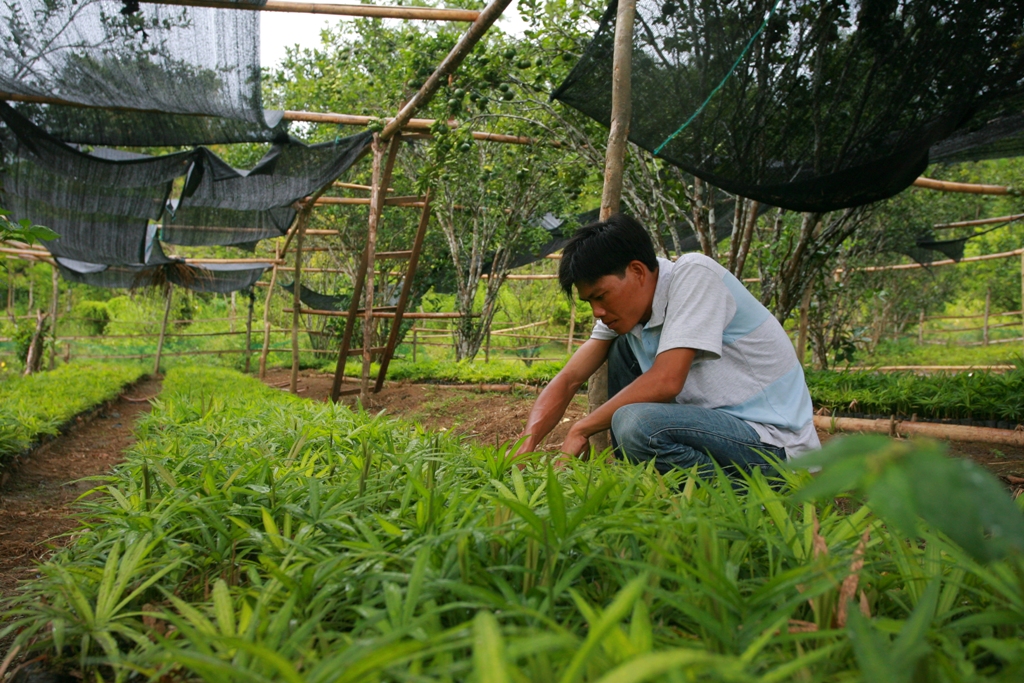GLAND, Switzerland – Small and medium-sized Asian businesses specializing in forest and ecosystem services can play a key role in reducing deforestation in the region, according to a new study.
The Impact in the Forests: The potential for business solutions to combat deforestation in large forest landscapes in Asia report, released today, explores ways to create business solutions for deforestation-free trade chains in Asia.
Analyzing the policy and entrepreneurial context in three landscapes across Asia, the report highlights how supporting innovative small-scale green businesses could help reverse the current trend where business incentives for promoting deforestation remain greater than those for preventing it. The study shows that this trend persists despite recent deforestation-free commitments made by several countries and the UN push to halt deforestation by 2020.
The report comes as negotiators meet this week in Bonn, Germany to agree important elements of the new global climate deal, including on forests and land use.
“This report shows the importance of bringing together entrepreneur incubators, impact investment and innovation support in a more coordinated fashion and increase investment in zero deforestation products,” said Paul Chatterton, head of WWF’s Landscape Finance Lab. “Policies and practices need to be focused to assist new business development if governments and donors want to meet their deforestation-free commitments.”
A collaboration between five organizations – WWF, Ennovent, Impact Hub, Clarmondial and GreenWorks Asia – the report draws on case studies from three key biodiverse countries that represent the range of conditions across Asia including: the Central Truong Son area in Vietnam; Kalimantan and Sumatra in Indonesia; and the Terai Arc region in the lowlands of Nepal.
The report shows that there is strong potential for innovative green business approaches. Sectoral analyses in the study show the kinds of enterprises that might contribute positively to addressing deforestation, such as rubber, cocoa, rattan, essential oils and medicinal plants. A good example is The Mountain Institute work to turn medicinal and aromatic plant production as a profitable business for small producers. Since 2001, The Mountain Institute has increased the income of over 15000 farmers through training and supporting the sustainable cultivation of plants such as Chiraito (Swertiya chirayita), Lothsalla (Taxus wallichiana) (CITES listed), Satuwa (Paris Polyphylla) and Seto Bikhuma (Aconitum ferox, A. spicatum). The institute in partnership with WWF and business innovation company Ennovent plans to join forces in the future to secure certifications for organic production, quality processing and good forest management – including in the buffer zones of national parks – strengthening linkages to the profitable global cosmetic and pharmaceutical industry.
“The creation of forest-friendly business has barely begun,” said Peter Scheuch, Managing Director of Ennovent. “An initiative is now needed to build evidence and foster an ecosystem approach to link services, policies and incentives
The Impact in the Forests: The potential for business solutions to combat deforestation in large forest landscapes in Asia report, released today, explores ways to create business solutions for deforestation-free trade chains in Asia.
Analyzing the policy and entrepreneurial context in three landscapes across Asia, the report highlights how supporting innovative small-scale green businesses could help reverse the current trend where business incentives for promoting deforestation remain greater than those for preventing it. The study shows that this trend persists despite recent deforestation-free commitments made by several countries and the UN push to halt deforestation by 2020.
The report comes as negotiators meet this week in Bonn, Germany to agree important elements of the new global climate deal, including on forests and land use.
“This report shows the importance of bringing together entrepreneur incubators, impact investment and innovation support in a more coordinated fashion and increase investment in zero deforestation products,” said Paul Chatterton, head of WWF’s Landscape Finance Lab. “Policies and practices need to be focused to assist new business development if governments and donors want to meet their deforestation-free commitments.”
A collaboration between five organizations – WWF, Ennovent, Impact Hub, Clarmondial and GreenWorks Asia – the report draws on case studies from three key biodiverse countries that represent the range of conditions across Asia including: the Central Truong Son area in Vietnam; Kalimantan and Sumatra in Indonesia; and the Terai Arc region in the lowlands of Nepal.
The report shows that there is strong potential for innovative green business approaches. Sectoral analyses in the study show the kinds of enterprises that might contribute positively to addressing deforestation, such as rubber, cocoa, rattan, essential oils and medicinal plants. A good example is The Mountain Institute work to turn medicinal and aromatic plant production as a profitable business for small producers. Since 2001, The Mountain Institute has increased the income of over 15000 farmers through training and supporting the sustainable cultivation of plants such as Chiraito (Swertiya chirayita), Lothsalla (Taxus wallichiana) (CITES listed), Satuwa (Paris Polyphylla) and Seto Bikhuma (Aconitum ferox, A. spicatum). The institute in partnership with WWF and business innovation company Ennovent plans to join forces in the future to secure certifications for organic production, quality processing and good forest management – including in the buffer zones of national parks – strengthening linkages to the profitable global cosmetic and pharmaceutical industry.
“The creation of forest-friendly business has barely begun,” said Peter Scheuch, Managing Director of Ennovent. “An initiative is now needed to build evidence and foster an ecosystem approach to link services, policies and incentives
The report also looks at the various actors – innovators, investors and connectors – who might be involved in the scale-up and consolidation phase for forest-friendly initiatives and outlines recommendations to create and replicate successful models of deforestation-free social enterprises in other affected areas.














